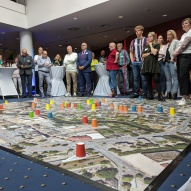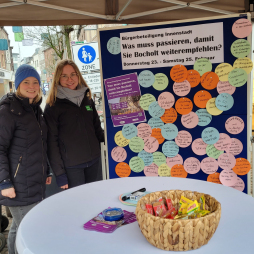28. February 2024
City management
City centre strategy "Collective system change"
The consulting firm Stadt + Handel from Hamburg has been supporting city marketing and the city of Bocholt in updating existing concepts for Bocholt's city centre since the beginning of 2023. The newly developed city centre strategy entitled "Collective System Change" aims to implement the necessary transformation processes due to external framework conditions through innovative strategies and concrete measures. In recent months, various participation processes have been carried out - citizen surveys on the market square, speed dating, a youth evening in the Kinodrom and a city centre camp in the former Stadtsparkasse Bocholt. Right from the start, important stakeholders from politics, retail, gastronomy, administration, Generation Z and the Bocholt population were involved in determining the status quo of Bocholt's city centre and jointly developing the goals.
The measures and ideas collected were prioritised by Stadt + Handel and Stadtmarketing and integrated into the city centre concept, taking into account the strategic considerations of Stadt + Handel. The aim is to revitalise Bocholt's city centre through targeted measures and adapt it to current requirements. By developing new and adapted strategies as well as concrete measures, a sustainable improvement of Bocholt's city centre is aimed for.
The city centre strategy focuses on the following five guiding principles for the orientation and positioning of Bocholt's city centre:
#progressive: Change of basic attitude.
The previous plans and findings from the participation process show a conservative approach to city centre development, characterised by problem-related and sectoral solutions. In order to promote the sustainable acceptance and attractiveness of Bocholt's city centre, Stadt + Handel recommends a progressive attitude that boldly, preventively and actively shapes the transformation. This requires a shift from sectoral to overarching considerations and from planning to dynamic strategy, involving interdisciplinary teams of experts from urban planning and city marketing as well as interactive action plans and development processes.
#collaborative: Change in the organisation.
The change in the basic approach to city centre development requires a redesign of the organisation, with responsibility shifting from sectoral to collective. In order to clarify the necessity of an organisation for inner city development, Stadt + Handel sees a quick, feasible and at the same time sustainable structure in an inner city control centre. This control centre should coordinate all the activities of public and private stakeholders, under the strategic and organisational responsibility of the mayor, city planning officer and city marketing director.
#focussed: Changing the spatial perspective.
The Hamburg experts recommend developing Bocholt's city centre in future less through planning guidelines and more through collaborative forces, private initiatives and innovative concepts. A flexible framework with investment spaces, intervention spaces and innovation spaces should allow individual freedoms while at the same time demanding collective obligations. The aim is to utilise the diversity of the subspaces effectively and ensure long-term economic sustainability.
#adding value: change in budgetary sovereignty.
Stadt + Handel proposes creating a separate economic plan for the city centre that takes into account all public and private-public activities of all departments and city subsidiaries. This serves to plan and cover the resource requirements for city centre development in the following financial year and is part of the municipal budget. The economic plans are drawn up in close coordination within the control centre in the investment and consumption areas.
#consequent: change in the operating units.
The city centre strategy developed by Stadt + Handel envisages that responsibility for city centre development will not rest on individual shoulders. Instead, autonomous competence teams will be formed, primarily from urban planning and city marketing as well as city centre stakeholders, which will coordinate the operational implementation of the measures and financing concepts from the business plans, with the city centre control centre taking on overall coordination.
Recommendations for action
In order to concretise the guiding principles of the city centre strategy and ensure initial implementation in 2024, the following five recommendations for action are the first consequences of the previous participation process.
Field of action 1: "MAKE": Visible signs. Or: Motivation through implementation
The realignment of Bocholt's city centre requires a strong commitment at both private and municipal level, with the aim of actively promoting the basic load of transformation. The focus is on implementing concrete projects from participation formats, inner-city initiatives and city departments, emphasising that implementation is crucial and that the first visible signs could be implemented quickly.
Field of action 2:"FunctionalChange": Accelerator.or: A process accelerator for city centre transformation
Bocholt city centre is responding to the desire for attractive and varied city centre areas and the lack of new talent by introducing a "Accelerator" together with partners from the participation process. This "Accelerator" aims to shape new business models for the city centre and put them into practice. After a defined period, a decision will be made on the continuation of the business model and, if the vote is positive, a suitable "roll-out" with up to two years of support from the city centre control centre will take place.
Field of action 3:"Urban design & spatial development": On the squares. Or: Working together to raise the profile
The inner-city squares play a decisive role in raising the profile of Bocholt's city centre, and their attractiveness has a significant influence on how they are perceived. The weekly market in front of the historic town hall is an outstanding attraction, but it needs to be developed further in order to secure its importance as a flagship of the city centre. Particular attention should be paid to the development of the Gasthausplatz as a prototypical example, in which different departments such as urban planning and city marketing should work together in the control centre in an overarching responsibility, accompanied by external expertise and with the participation of local residents and property owners.
Field of action 4:"Digitalisation": Keeping up with the times.or: A digitalisation roadmap for the city centre
Bocholt's city centre offers a good basis for its further development as an attractive destination, both digitally and analogue. Increasing digitalisation requires continuous adaptation of distribution concepts, which also applies to the city centre, as the discussion about an effective parking guidance system shows. Initiated by the city centre control centre, a joint process will once again be used to work on an implementation-focused digitalisation strategy for Bocholt's city centre. One possible practical example is the implementation of a digital parking system for the city centre.
Field of action 5:"Ad hoc measures": The right framework. Or: A readjustment of standards and specifications
The transformation of Bocholt's city centre is proving challenging due to external influences such as wars, despots, pandemics and political measures at European, national and state level. In addition, legal regulations and local ordinances restrict the freedom of action of the transformation. In order to create a suitable framework, a comprehensive analysis of the municipal legal framework is to be carried out by an external law firm. In particular, those standards that are already being actively applied, such as regulations on parking space compensation, settlement issues, infrastructure issues and changes in building use, will be considered in order to create a conducive framework for innovation and value creation in the city centre.
The invitation to the presentation of the city centre strategy entitled "Collective System Change" was accepted on Tuesday evening by over 100 interested Bocholters from a wide range of sectors.
After Stefan Postert from Stadt + Handel presented the city centre strategy and briefly outlined the development process, a number of questions from the audience were answered by Mayor Thomas Kerkhoff, Stefan Postert and City Marketing Director Ludger Dieckhues.
The complete city centre strategy is available for download in the section below.



.jpeg?height=431&width=575)



